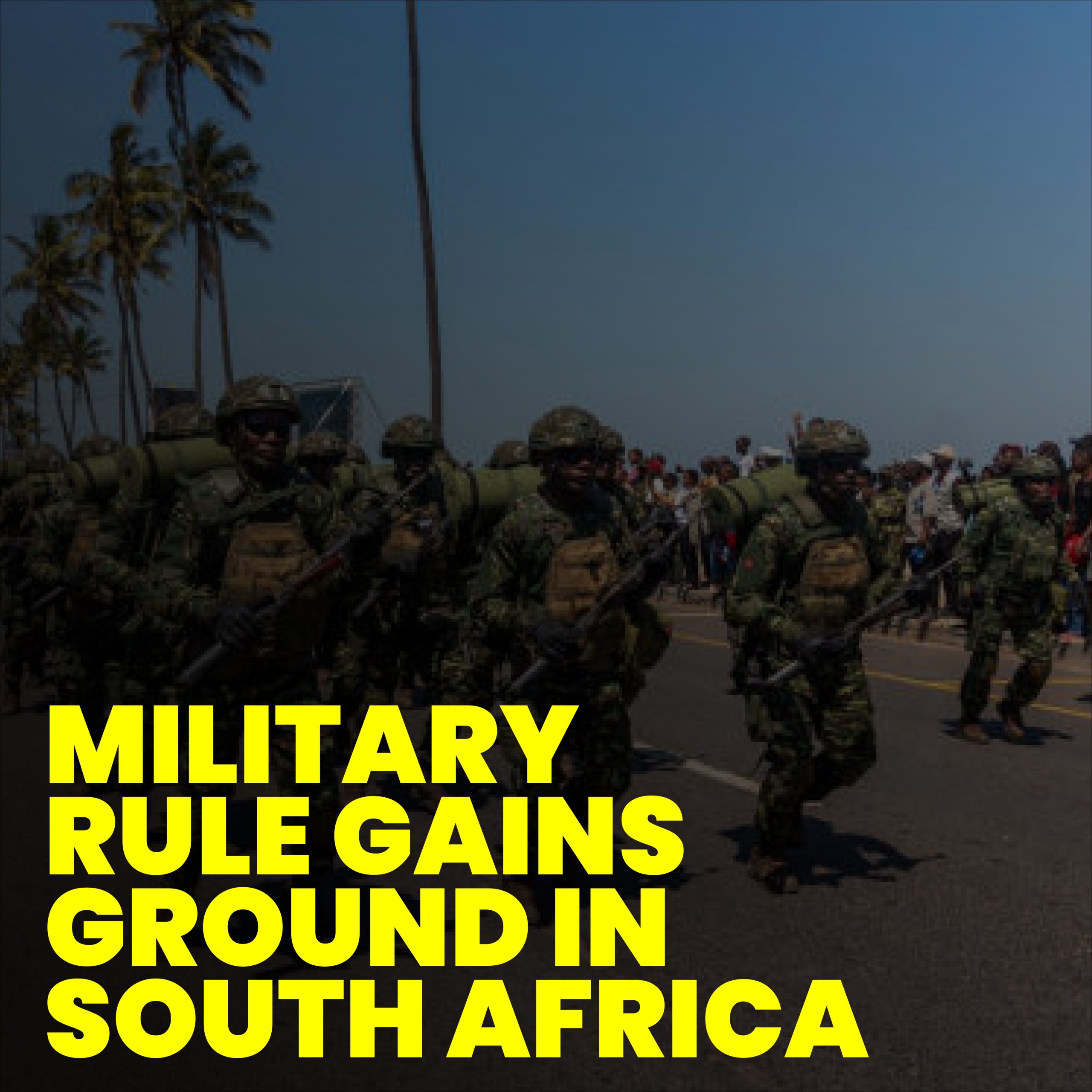Introduction
A striking Afrobarometer result has reopened debate about the possibility of military involvement in South African politics. Nearly half of respondents say they would tolerate army intervention in government under certain conditions — a sharp shift from a decade earlier and a signal that public patience with the status quo is fraying. This data point is less about a sudden hunger for authoritarianism than it is about frustration with persistent dysfunction: failing service delivery, entrenched corruption, and stagnant job markets. The reaction should be taken as a warning bell. If leaders fail to address root causes of discontent, sympathy for extra-constitutional fixes will remain a dangerous part of political life.
Military Rule and Political Apathy
Political apathy has settled into many parts of the electorate. Voter turnout in local and national elections has trended downward, while trust in party structures and elected officials has waned. When voters feel their choices do not improve daily life, participation becomes transactional at best and indifferent at worst.
In that vacuum, the idea of military governance acquires an emotional appeal: it promises decisiveness, order and, crucially, a break from the politics of patronage. This is often an illusion. Where popular engagement declines, civic institutions weaken, feedback loops that hold leaders accountable fray, and the space for populist or illiberal alternatives grows. Reversing political apathy therefore requires renewing the incentives for participation — showing that ballots change outcomes and that civic voice matters in tangible ways.
Military Rule and Economic Anxiety
Economic stagnation is the most tangible driver of the current mood. High unemployment, especially among young people, combined with rising living costs have left households precarious and pessimistic. Without visible signs of economic improvement, many citizens begin to question the effectiveness of democratically elected administrations.
The allure of an army-led administration in this setting is tied to a belief that strict command structures can fix bureaucratic inefficiency and enforce discipline in public spending. This belief is potent in conversations about productivity and order: an imagined, decisive actor who will prioritize infrastructure, clamp down on graft, and restore services. Yet history suggests that economic recovery depends on coherent policy, inclusive growth strategies, and institutions that foster investment and innovation — not shortcuts to centralized control. Addressing economic anxiety therefore means delivering policies that create jobs, improve skills and remove barriers to entrepreneurship.
Military Rule and Leadership Vacuum
One reason authoritarian fantasies gain traction is a perceived leadership vacuum. Frequent political scandals, internecine factionalism and public displays of incompetence create an image of governance consumed by internal politics rather than public service. Citizens who see leaders more focused on survival than on solving problems may begin to yearn for simpler command structures that bypass politicking.
But the problem is not only the presence of weak leaders; it is the absence of leadership that listens, plans and delivers. Restoring confidence requires leaders who combine competence with accountability — visible problem-solving, clear performance targets for ministries and regular reporting on results. When leadership demonstrates results in the neighborhoods where people live, the appeal of any alternative that promises a quick fix diminishes.
Military Rule in the African Context
The discussion in South Africa reflects a wider regional phenomenon. Over the past decade, a number of countries in West and Central Africa have experienced coups or military interventions that reshaped political expectations. Where civilian institutions faltered, some citizens expressed conditional support for military actors promising to restore order and fight corruption.
South Africa’s concern is distinctive because of its democratic track record and legal traditions. Still, cross-border developments influence narratives: social media amplifies images of soldiers restoring order in troubled contexts, and comparative stories can make intervention seem less novel and more feasible. Yet the continental pattern also teaches caution: interventions that begin with promises of short-term order often entrench clients, limit freedoms and delay the hard, structural reforms that durable development requires.
Military Rule and Citizen Trust
Trust in public institutions is central to whether democratic systems weather crises. In many recent polls, confidence in the police, local councils and certain executive functions has fallen. By contrast, armed forces often maintain higher institutional trust scores, viewed as disciplined and apolitical by parts of the population.
This trust gap helps explain why the prospect of military governance resonates — people imagine an institution that can act fairly and decisively. But the distinction between respect for military professionalism and the endorsement of political rule is crucial. Trust in institutions must be reinforced by strengthening civilian oversight, transparency mechanisms and independent checks that make democratic institutions more responsive and resilient.
Military Rule and Media Narratives
Public understanding of governance is mediated through news outlets and social platforms that shape how crises are interpreted. Sensational reports of corruption or governance failure, if left unpaired with coverage of reform efforts and institutional responses, can harden pessimism. Similarly, viral narratives that highlight short-term order under military actors without exploring long-term costs can warp public judgement.
Combating this requires a healthier information environment: journalists and editors who contextualize failures, civic organisations that highlight solutions and media literacy initiatives that help citizens distinguish between short-term spectacle and sustainable policy. Clear communication from governments about reforms and measurable progress can also counteract simplifications that make authoritarian fixes seem attractive.
Military Rule and the Risks of Short-Term Remedies
The record shows that military interventions rarely solve structural problems. Even when they produce initial signs of order, authoritarian arrangements often erode judicial independence, weaken parliamentary oversight and concentrate power in ways that become self-perpetuating. Economic management under such systems can also deteriorate as patronage and opacity replace transparent processes.
Therefore, while the public’s temptation toward intervention is understandable in the face of daily hardship, the risk calculus must be made explicit: short-term control often yields long-term fragility. The healthier route is to shore up institutions capable of delivering services, enforce accountability mechanisms, and sustain political competition that incentivises performance.
Military Rule and Policy Pathways for Renewal
If the goal is to make democratic governance more credible, policy responses must be bold and visible. Several interlocking approaches matter:
• Economic inclusion: scale up public works, support small and medium businesses, and implement targeted skills training that connects young people to labour markets.
• Anti-corruption architecture: strengthen procurement transparency, empower independent investigators, and ensure visible prosecutions for high-level graft.
• Service delivery: invest in municipal capacity, maintain infrastructure, and prioritise reliable electricity, water and sanitation in affected communities.
• Civic engagement: revitalize local participation channels so citizens can monitor progress and hold officials to account.
• Communication and accountability: publish clear timetables and measurable targets for reforms and report progress regularly.
These measures cannot be instantaneous, but when citizens see tangible improvements — better electricity, clearer accounting of public funds, real job placements — the impulse toward undemocratic alternatives diminishes.
Military Rule and the Role of Youth
Any strategy must prioritise the concerns of young people, whose expectations and frustrations will shape the country’s political future. Job creation, apprenticeships linked to private-sector demand, and pathways into entrepreneurship will reduce the appeal of quick authoritarian fixes. Similarly, channels for youth political participation — from councils to civic forums — can transform disaffection into constructive engagement.
Beyond economic policies, educational programmes that teach civic responsibility and critical thinking help inoculate future generations against simplistic narratives that present force as a panacea. Investing in youth is therefore both a moral and strategic necessity.
FAQs
1. How widespread is support for military intervention?
Survey data indicates that close to half of respondents expressed conditional openness to army involvement in government under specific circumstances, reflecting growing frustration with current political performance.
2. Does support for army rule mean a coup is imminent?
Not necessarily. Expressing conditional support in a survey is different from coordinated political mobilisation. However, the sentiment is a warning sign that should prompt reform-minded responses.
3. Can military governments reduce corruption quickly?
They may take swift action in some cases, but long-term evidence shows that authoritarian control often replaces one set of unaccountable practices with another, undermining sustainable transparency and rights protections.
4. What immediate steps can reduce support for undemocratic options?
Delivering visible economic improvements, enforcing anti-corruption measures, improving service delivery at the local level, and opening meaningful channels for citizen oversight are essential.
Conclusion
The surge in openness to military involvement reflects deep governance failures—economic stagnation, eroding trust, and weak leadership. It’s not an ideological shift toward authoritarianism but a sign of public frustration. The solution lies in democratic renewal: creating jobs, enforcing accountability, improving services, and rebuilding civic trust. If leaders act decisively, faith in democracy can be restored; if not, frustration may harden into support for undemocratic shortcuts that threaten South Africa’s democratic foundations.




